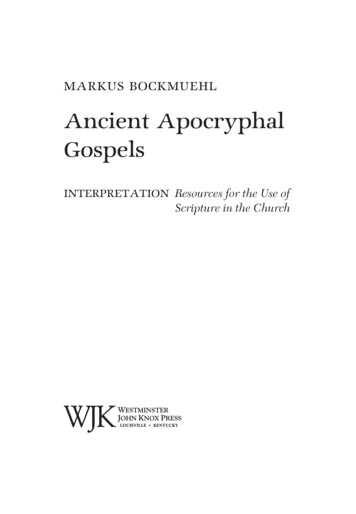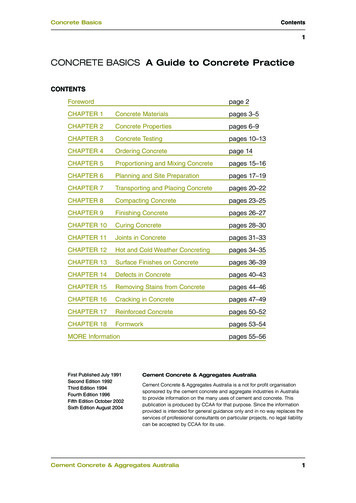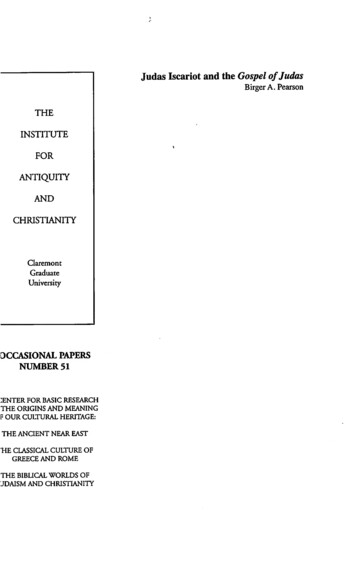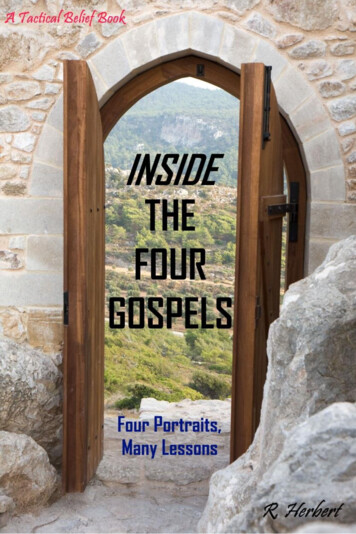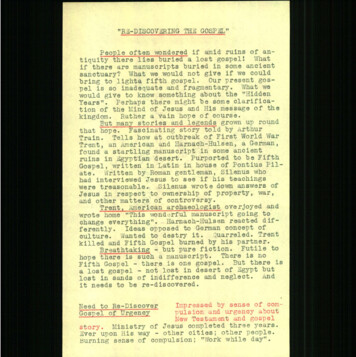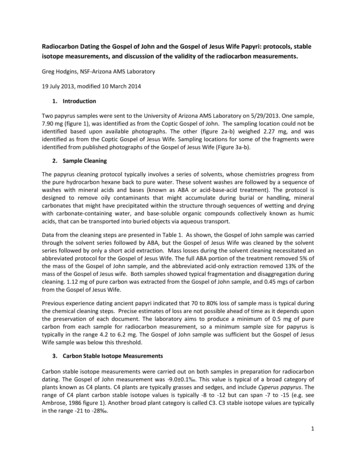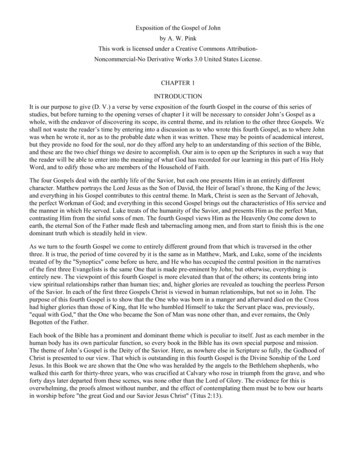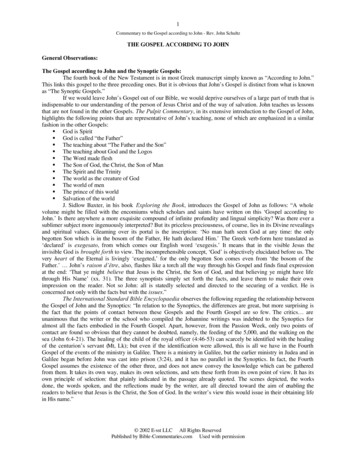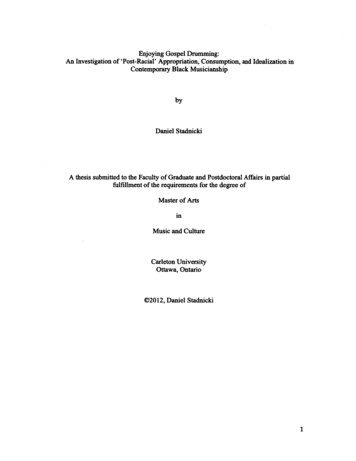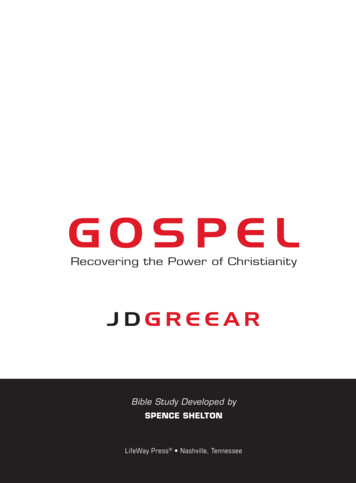
Transcription
GOSPELRecovering the Power of ChristianityJDGREEARBible Study Developed bySPENCE SHELTONLifeWay Press Nashville, Tennessee
Spence SheltonWriterJoel PolkEditorial Team LeaderReid Patton, Brian GassContent EditorsBrian DanielManager, Short-Term DiscipleshipDavid HaneyProduction EditorMichael KelleyDirector, Groups MinistryJon RoddaArt DirectorPublished by LifeWay Press 2011 J. D. Greear Revised 2018Previously published as Gospel RevolutionNo part of this work may be reproduced or transmitted in any form or by any means, electronic or mechanical,including photocopying and recording, or by any information storage or retrieval system, except as may be expresslypermitted in writing by the publisher. Requests for permission should be addressed in writing to LifeWay Press ;One LifeWay Plaza; Nashville, TN 37234.ISBN 978-1-5359-2566-2 Item 005808004Dewey decimal classification: 248.84Subject headings: DISCIPLESHIP \ CHRISTIAN LIFE \ BIBLE—N.T. GOSPELSScripture quotations are taken from the Christian Standard Bible , Copyright 2017 by Holman Bible Publishers.Used by permission. Christian Standard Bible and CSB are federally registered trademarks of Holman BiblePublishers.To order additional copies of this resource, write to LifeWay Resources Customer Service; One LifeWay Plaza;Nashville, TN 37234; email orderentry@lifeway.com; fax 615-251-5933; phone toll free 800-458-2772; orderonline at LifeWay.com; or visit the LifeWay Christian Store serving you.Printed in the United States of AmericaGroups Ministry Publishing LifeWay Resources One LifeWay Plaza Nashville, TN 37234
CONTENTSAbout the Author . . . . . . . . . . . . . . . . . . . . . . . . . . . . . 4Welcome to a Gospel Revolution!. . . . . . . . . . . . 5Gospel Reading Plan . . . . . . . . . . . . . . . . . . . . . . . . . . 6The Gospel Experience. . . . . . . . . . . . . . . . . . . . . . . . 7WEEK 1Gospel Change. . . . . . . . . . . . . . . . . . . . . . . . . . . . 8WEEK 2Gospel Discovery. . . . . . . . . . . . . . . . . . . . . . . . . . 22WEEK 3Gospel Acceptance. . . . . . . . . . . . . . . . . . . . . . . . 38WEEK 4Gospel Approval. . . . . . . . . . . . . . . . . . . . . . . . . . . 52WEEK 5Gospel Response. . . . . . . . . . . . . . . . . . . . . . . . . . 68WEEK 6Gospel Faith. . . . . . . . . . . . . . . . . . . . . . . . . . . . . . . 82WEEK 7Substitute Gospels. . . . . . . . . . . . . . . . . . . . . . . . 98WEEK 8Gospel Depth . . . . . . . . . . . . . . . . . . . . . . . . . . . . . 112Leader Guide. . . . . . . . . . . . . . . . . . . . . . . . . . . . . . . . . . 128Group Directory. . . . . . . . . . . . . . . . . . . . . . . . . . . . . . . 144
About the AuthorAt the age of twenty-seven, J. D. Greear became thepastor of a forty-year-old neighborhood church. In theyears since, that congregation of four hundred hasgrown to more than five thousand in weekly attendance.Today the Summit Church, located in Raleigh-Durham,North Carolina, is one of the fastest-growing churchesin North America.J. D.’s messages aren’t intended just to showpeople how to live better lives. His goal is to leavepeople in awe of God’s amazing love. Because of hisbelief in the power of the gospel, J. D. has led theSummit to set a goal of planting more than one thousand gospel-centeredchurches in the next forty years.J. D. holds a PhD in systematic theology from Southeastern BaptistTheological Seminary. He also lived and worked among Muslims in SoutheastAsia for two years and wrote Breaking the Islam Code. J. D. and his beautifulwife, Veronica, have four ridiculously cute kids: Kharis, Alethia, Ryah, and Adon.Unless God calls him elsewhere, J. D. plans to stay at the Summit Churchuntil he preaches his last sermon at his own funeral before saying goodbyeand hopping into the casket.Spence Shelton developed this Bible study. Spence is the lead lastor of MercyChurch in Charlotte, North Carolina. Mercy Church launched in September2015 with the vision of seeing a gospel awakening move through the peopleof Charlotte and extend to the ends of the earth.Spence has coauthored several books, including The People of God andthe small-group studies Jesus the King, The Meaning of Marriage, The Gospelaccording to Jonah, and Presence: Overwhelmed by God.Spence earned a BS in business administration from the University ofNorth Carolina in Chapel Hill and an MDiv in Christian ethics from SoutheasternBaptist Theological Seminary. Spence and his wife, Courtney, have fourchildren: Zeke, Ben, Ellie, and Haddie.4GOSPEL
Welcome to a Gospel Revolution!For many years my Christianity seemed to consist of a list of things to do andnot to do. The results were spiritual frustration and weariness. Learning todwell on the gospel changed all that. It produced in me the one thing religioncouldn’t: a desire for God.The gospel isn’t just the way we begin in Christ; it’s also the way we growin Christ. Dwelling on the gospel produces freedom, joy, radical sacrifice, andaudacious faith. The gospel has revolutionized my life, and it has revolutionizedour church. I believe it will revolutionize yours too.In light of that conviction, I’d like to encourage you to do a couple ofthings concurrently with this Bible study. For the next eight weeks, pray thefour parts of the gospel prayer and read along with me the four Gospels:Matthew, Mark, Luke, and John.Why? Because I want you to saturate yourself in the gospel every day.The most gospel-centered books ever written are the Gospels. You’ll findJesus there. Dwell with Him in the Gospels for eight weeks and let the gospelprayer saturate your heart and mind with His beauty and love. I think you’llnever be the same.Here’s the gospel prayer that we’ll learn more about in the weeks ahead.Part 1: “In Christ there’s nothing I can do that would make You love me more,and there’s nothing I’ve done that would make You love me less.”Part 2: “Your presence and approval are all I need for everlasting joy.”Part 3: “As You’ve been to me, so I’ll be to others.”Part 4: “As I pray, I’ll measure Your compassion by the cross and Your powerby the resurrection.”Blessings to you as you begin your gospel revolution!J. D. Greear5
Gospel Reading PlanBegin the following forty-day Gospel reading plan after your first small-groupsession. To stay on track, read and check off five passages each week.6GOSPELDAYREADINGDAYREADING1Matthew 1–2 21Luke 5–6 2Matthew 3–422Luke 73Matthew 5–723Luke 8–94Matthew 8–924Luke 10–115Matthew 10–1225Luke 12–136Matthew 13–14 26Luke 14–16 7Matthew 15–1627Luke 17–198Matthew 17–1828Luke 20–219Matthew 19–2029Luke 22–2410Matthew 21–2330John 1–211Matthew 24–25 31John 3–4 12Matthew 26–2832John 5–613Mark 1–333John 7–814Mark 4–534John 9–1015Mark 6–735John 11–1216Mark 8–10 36John 13–14 17Mark 11–1337John 15–1618Mark 14–1638John 1719Luke 1–239John 18–1920Luke 3–440John 20–21Week 1Week 2Week 3Week 4Week 5Week 6Week 7Week 8
The Gospel ExperienceWelcome to an eight-week journey through the Gospels that we hopewill lead you, as well as your church, to a gospel revolution. Here’s howthe study works.Introduction. Each week begins with a narrative overview of the weeklytopic. You’ll probably want to read this introduction before your groupmeets so that you’ll better understand the topic and the context for thegroup session.Start. Your actual group session will most likely begin here with anicebreaker that’s designed to help you ease into the study and geteveryone talking. A brief description of J. D.’s teaching helps set thestage for hearing from God during each video teaching segment.Watch. Key statements from the video session are provided so thatyou can follow along and take notes as J. D. teaches.Discuss. These questions help the group study passages that reinforceJ. D.’s teaching in the video. Each question is designed to lead thegroup deeper into the gospel so that the gospel becomes foundationalin members’ lives. These questions facilitate the work that the HolySpirit is accomplishing in the lives of individuals and the group.Respond. These gospel exercises allow group members to enjoy asmaller group experience, which increases the likelihood that everyone’svoice will be heard. Although some of these activities introduce furtheropportunities for Bible study, some focus on prayer, meditation, andencouragement.Close. This section concludes the group session and summarizes keypoints. It also offers a final challenge and a time to pray together.Personal study. Three or four devotions are provided each week tobe completed after the group session. These devotions complement theGospel reading plan so that group members are immersed in the poolof the gospel throughout this Gospel experience.7
vWeek 1GOSPEL CHANGEGod doesn’t need anything from us.8GOSPEL
Hear this plainly. God doesn’t need anything from us.What God wants is the affections of our heart.Our opening week’s study explores the coreconcepts of living a gospel-centered life. ManyChristians are living in a difficult tension. They’refighting to follow the teachings of Jesus and thecommands of Scripture, yet the result isn’t theabundant life they long for. They may be bringing theirbehavior in line with God’s rules, but their heartsare still running from Him. Usually without realizingit, they’ve let God their Father take a back seat toGod their Judge. As a result, they’re left in a dailygrind trying to appease God. The end of this roadis either empty religious routine or abandonment ofthe Christian faith altogether. Both are a far cry fromthe revolutionary power of the gospel that Jesusunleashed on earth.The primary aim of this first week’s study willbe to develop a clear distinction between religiouschange and gospel change. The common theme inthe Scriptures and in this week’s study is that Goddoesn’t want more religious conformity; He wantsour love. We have a tendency in religious circles tofill our lives to the brim with religious activities. Forthe most part, these activities in themselves aregood, God-honoring pursuits. The reality, however,is that habitual Christianity may be the number-onekiller of the joy-filled life Christ has offered us. A goodquestion for us is, Are we trying to earn God’s loveand affection, or are we living in the joy of God’s lovethat’s been declared over us in the gospel?Gospel Change9
StartIf you grew up in church, what do you remember most about it?If you didn’t, what was your impression, if any, of church?Do you recall anything about your past church experience thatnow seems antiquated, funny, or out of place?Begin this week by answering a few questions below. Ask everyone torecord their answers. We’ll return to these questions in group session 8to observe ways we’ve changed. Think of this activity like preparationfor a workout or a diet. Though it’s painful, good wisdom says to get onthe scale and see where you are so that later you can celebrate howmuch you’ve changed. In this case, however, we’ll celebrate how muchGod has changed us!In your own words, what’s the gospel?Why did you become a Christian, or why would you want to?What do you hope to gain from this study during the nexteight weeks?When you hear the word gospel, what comes to mind? Many of ushave some exposure to this word, whether from church, media, or popculture. But do any of us really grasp the significance that the gospelcould have on our everyday lives? Do we understand the power availableto us in the gospel? In video session 1 J. D. Greear introduces theconcept of a gospel-centered life and its power to unlock the power andjoy we may be missing.10GOSPEL
WatchWatch video session 1.Mechanical change is change from the outside. That is how you changethings that aren’t alive.Religion changes you externally by adding things to your life.In organic change, your behavior changes because you change.You worship whatever you deem essential for life and happiness.What God desires is a heart that desires Him.The gospel tells you not to change in order to earn the approval of Godbut because you have the approval of God.The gospel reveals God’s beauty in a way that we begin to desire Him.The gospel reveals God’s mercy so that we begin to love Him.Gospel-centered change is not about giving you a list of things you need togo and do for God but making you stand in awe of what He has done for you.Video sessions available at lifeway.com/gospelor with a subscription to smallgroup.comGospel Change11
DiscussUse the following questions to discuss the video teaching.How would you summarize the key message of this session’svideo teaching? Did anything surprise you or challenge youin a way you didn’t expect?Read 1 Corinthians 15:1-4. Based on these verses, what’s thegospel? Work together to arrive at a scriptural definition forthe group moving forward.The gospel, in its essence, is the message that Jesus lived a perfectlife, died a sacrificial death, was buried, and rose on the third day invictory over sin and death. The whole Bible centers on this revelation.Let’s start looking at what the apostle Paul had to say about the gospel.Read Paul’s prayer in Ephesians 3:16-21. What requests did Paulmake on the people’s behalf?What does the nature of Paul’s requests tell you about what hebelieved to be central to the Christian life? How might his beliefsdiffer from what we often believe to be the primary purposeof the Christian life?Paul tells us that God initiates and grants us the ability to knowand love Him. Hearing the gospel informs us, but the Holy Spirittransforms us. How does this understanding affect the waywe approach life change?12GOSPEL
The love of God for us is an abundant well we draw from to live our livesfor His glory. Jesus Christ taught and embodied this love.Read Matthew 22:37-39. Here Christ quoted Deuteronomy 6:4-9,which was a central prayer for the Jewish community. Why doyou think Christ called this the greatest commandment? How didJesus expand the commandment given in Deuteronomy?Read Luke 7:44-48. Jesus affirmed the faith of a sinful womanby showing how much she loved God because of how much she’dbeen forgiven. What obstacles keep us from having faith like thiswoman on a daily basis?The love of Christ, most visibly displayed in the gospel, is more valuablethan anything else. Now we’ll investigate ways His love plays outin daily life.Which statement tends to be truer of the way you operate on adaily basis—“I love because He first loved me” or “I love becauseI’m supposed to”? What’s the difference between these two ideas?Although the Christian life is supposed to be freeing, many timeswe feel burdened by it. What do you find to be the most difficultpart of being a Christian? What are some possible reasons? Howdoes the gospel bring a fresh perspective?Gospel Change13
RespondDivide into same-gender groups of two or three people. As each groupdiscusses the prompts below, everyone should write down his or heranswer. After ten minutes reconvene as a group.In three words describe what the gospel means to you personally.Discuss with your smaller groups why you chose those threewords. When you reconvene with the rest of the group, a coupleof people should share their responses.CloseThe center of the Christian faith isn’t a set of rules to follow but a lovingFather who rescues His children from death and gives them new life.Once we start to realize His love for us, the natural response is tolove Him in return. Love for God is the core of Christianity. In this lovewe joyfully live in step with the design for living that He has given us inthe Scriptures. We aren’t under the rule of an exacting dictator whodemands that we earn His favor but under the care of a Father whoseinstructions flow from His love for us.Pray together.14GOSPEL
This WeekMATTHEW 1–12This week’s personal study begins our intense, eight-week spiritualworkout of reading all four Gospels. This week’s Gospel readingis Matthew 1–12. Refer to the reading plan below to find out whatpassages to read each day.On the following pages you’ll find three devotional thoughts designedfor you to use in conjunction with your daily Gospel readings.This Week’sReading PlanDay 1 T Matthew 1–2Day 2 T Matthew 3–4Day 3 T Matthew 5–7Day 4 T Matthew 8–9Day 5 T Matthew 10–12Gospel Change15
Day 1 Matthew 1THE FAMILY TREEThe opening chapter of the Gospel of Matthew begins with a lookat Jesus’ family tree. Verse 1, “An account of the genealogy ofJesus Christ, the Son of David, the Son of Abraham,” wouldn’t havebeen lost on the first-century Jewish audience to which Matthew’sGospel account was tailored. David and Abraham were two of themost prominent figures in Jewish history, and God gave both men acovenant promising that the Savior of the world would come throughtheir lineage. Although the announcement in this verse may appearto us to be nothing more than opening movie credits, we’d be betterserved to see this genealogy as credentials—proof that Jesus is whoHe said He was in Matthew’s Gospel. These verses establish Jesus’royal right to the throne of God’s people.Now that the significance of Jesus’ lineage is clear, notice the makeupof the people listed in the first sixteen verses. It wouldn’t be uncommonin that day to establish someone’s lineage through a genealogy likethis. What’s uncommon is acknowledging women in such a list. Thishonor was normally reserved for men because they were the headsof households. How astonished readers must have been to see KingDavid’s name in the same sentence as Rahab’s and Ruth’s! Five womenin all, two Gentiles and three of questionable character, are includedin the genealogy of the Messiah. Heroes, kings, Gentiles, prostitutes,adulterers—Matthew was being very intentional with his list.We then cut right to the announcement and brief birth scene ofJesus Christ. The miraculous is introduced just eighteen verses into ourreading. Think about it. An angel came to tell a virgin woman that shewould be with child from the Holy Spirit. The child’s name meant “God iswith us” (v. 23), and He would save us from our sins. The supernaturalhand of God was all over this setting. What a scene! It feels unbelievable,but should we expect any less from God Himself? We’re only in chapter 1,but Jesus has arrived, and as you may expect, it’s kind of a big deal.16GOSPEL
REFLECTWhat does the inclusion of women and Gentiles alongside kingsand heroes in Jesus’ lineage foreshadow about the kingdom thatJesus was inaugurating? How have you personally benefited fromthat kingdom?Look at the angel’s announcement in verse 21. What was to beJesus’ primary purpose? What does that purpose mean to you?PRAY & MEDITATEPray that God will allow this one purpose of Jesus to rest in your mindand that it would declutter the various notions of Jesus that swirl inour culture. In a gospel-centered mind Jesus is first and foremost ourSavior and Lord.Gospel Change17
Day 2 Matthew 4LOVE CONQUERS ALLJesus had just heard the words of His Father: “This is my beloved Son,with whom I am well-pleased” (3:17). This is what every son longs tohear from his father. Immediately after His baptism, Christ was led outto be tempted by the Devil (see 4:1). What was Christ’s motivation forresisting Satan? It was the words of His Father. Because His Fatherlove Him so much, the temptations of Satan lost their luster, and Jesusrevealed them for the frauds they were. The best way you and I can fighttemptation is by resting deeper in Christ’s love for us. When we have allof our needs met in His love, temptation no longer has a hold over us.A friend of mine gave me an idea I’ve begun to use with my kids tohelp get this concept across. Every so often I look at my children andtell them I love them. Not too revolutionary, I know. But I follow that withthe question “Why does Daddy love you?” They’re still young, so theiranswers vary from “I don’t know” to “I love Daddy” to “Pretzels!” After amoment or two I tell them the answer: “Because you’re my children!”Only a couple of months into this practice, they’re already beginningto catch on. I want them to know as they grow up that their father’slove isn’t based on a merit system but on their identity. As they grow up,opportunities to question that love will come from every angle. Whetherthey reject me by lying to me or disobeying me or sense rejection fromme because they feel they’ve let me down, Satan will use such seasonsto cause my children to run from me. In those moments I want them tohear something familiar from me: “Why does Daddy love you? Becauseyou’re my children.” I don’t love them because they deserve it butbecause of who they are. I want that understanding to drive them backinto my arms, not farther from me.This is God’s call to us. In Christ we’re God’s children, and we canrest in His unwavering love for us.18GOSPEL
REFLECTSatan began his attack on Jesus by questioning the very identitythat God had just spoken over Jesus: “If you are the son of God ”(Matt. 4:3, emphasis added). Satan does the same to us. Howcan you remember your identity as God’s child this week?In what ways are you currently being tempted? How does thetruth that God is pleased with you (because of Christ) help you inthat struggle? Or if you have a hard time believing God is pleasedwith you, what truth in today’s Scripture can you depend on?God calls us to carry one another’s burdens (see Gal. 6:2) andto promote love and good works (see Heb. 10:24). Who’s anotherbeliever you could practice those ministries with on a consistentbasis? Try to take those actions this week.PRAY & MEDITATERomans 8:1-2 says:There is now no condemnation for those in Christ Jesus,because the law of the Spirit of life in Christ Jesushas set you free from the law of sin and death.Will you take time now to thank God that you’re free from the powerof sin over you? Ask Him to help you live today, especially in difficultmoments, in a constant awareness of and satisfaction in that freedom.Gospel Change19
Day 3 Matthew 6WHY SHOULD WE PRAY?This is the question the disciples asked Jesus. In truth, it’s the questionthat keeps many people from developing rich prayer lives. Most peoplewant to believe prayer works, but they have no idea where to start. Sowhen the need to pray arises, they offer God a skeptical but desperateplea to fix what’s broken in their lives. Often a lack of confidence inprayer turns into a mundane routine with little or no variance and littleor no connection with God.How did Jesus respond to this question? While the question thatthe disciples asked is recorded in Luke 11:1, the full response Christgave is recorded in Matthew 6:5-13. We refer to this famous passageas the Lord’s Prayer, though it would be far more accurate to call itthe Disciples’ Prayer since it’s Jesus’ prescription for our prayer lives. Ihope a look at this passage will free you to begin praying with confidencein the way God designed prayer to be practiced. Here are some waysJesus instructed us to pray. Pray to an audience of one (see vv. 5-6). The heart matters, not the tongue (see vv. 7-8). Prayer is first God-centered (see vv. 9-10). Pray as if your life depended on it (see vv. 11-13).Of course, prayer flows from a heart captivated by the gospel.20GOSPEL
REFLECTDoes your prayer life feel vibrant or mundane? Which of the fourelements on the previous page is your weakest link? How will thegospel change your perspective?I’ve recommended that you read the gospel prayer every weekthroughout this Bible study (see p. 5). How is the gospel prayeralready challenging your prayer life? How does praying it affectthe rest of your day?PRAY & MEDITATEThere would be no better passage to meditate on today than Matthew6:5-13. Pray the way Christ called His disciples to pray, but don’t justrecite the Lord’s Prayer. The psalmist’s prayer was:May the words of my mouthand the meditation of my heartbe acceptable to you,Lord, my rock and my Redeemer.PSALM 19:14Meditate on these words. Let them become your words from your mindand heart, not just words on a page. Then pray them to God.Gospel Change21
four parts of the gospel prayer and read along with me the four Gospels: Matthew, Mark, Luke, and John. Why? Because I want you to saturate yourself in the gospel every day. The most gospel-centered books ever written are the Gospels. You'll find Jesus there. Dwell with Him in the Gospels for eight weeks and let the gospel
